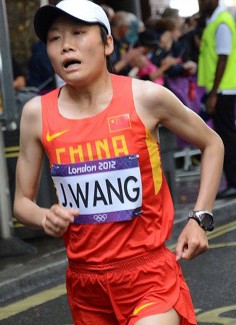
Doping on the rise in China
Violations already at same level for whole of 2012 ahead of Shenyang event; marathoner first to be caught because of biological passports

Biological passports for Chinese athletes caught their first suspected cheat as the country's anti-doping authorities announced that violations were on the rise ahead of the National Games.
Eight athletes tested positive in the second quarter of the year, China's Anti-Doping Agency (Chinada) said. Twelve positives have been registered this year, matching the total number of violations in 2012.

Biological passports monitor selected parameters over time that indirectly reveal the effects of doping rather than the doping substance itself.
Wang, 27, has been suspended since February after failing to explain anomalies in data from blood samples collected between May 2012 and January 2013.
"The number of positive cases has largely increased compared with that of last year, which sent us a warning," anti-doping chief He Zhenwen told Xinhua.
Zhao Jian, a deputy director of the anti-doping agency, said of the biological passport scheme, which was introduced in China in 2012: "The agency has been extremely prudent and the whole testing process has strictly followed international rules on using the new anti-doping scheme."
China is monitoring biological passports of 100 athletes, Zhao said.
Wang finished eighth in the 2011 World Championship Marathon in Daegu, South Korea, but ranked only 58th in the London Olympic Games last year. She has never tested positive in anti-doping tests before.
Among the eight doping cases registered in the second quarter, one tested positive in a preliminary boxing match for this year's National Games. The main event is to be held in Shenyang, the provincial capital of Liaoning - one of the country's sporting powerhouses - from August 31 to September 12.
The quadrennial event, first held in 1959 in Beijing when China was isolated from most of the rest of the sporting world, remains the major way the government appraises the work of provincial sports authorities.
Funding for provinces is largely based on their success at the Games, which has encouraged cheating in the past.
"There always will be someone who risks doping for unfair advantage when the return is lucrative," He added. "History taught us that the National Games could well be the reason for cheating."
The 11th version of the inter-provincial National Games attracted 15,133 athletes from 46 teams competing in 362 events in 33 sports in Jinan, Shandong Province in 2009.
China's 100 metres champion Wang Jing was banned for life after she tested positive for the performance-enhancing metabolites epitestosterone and testosterone after winning the 100m race at the 2009 Games.
In 2005, Sun Yingjie, a former world championship bronze medalist, tested positive after finishing second in the 10,000m - a day after winning the Beijing Marathon.
Additional reporting by Reuters